Donald Markwell
advertisement
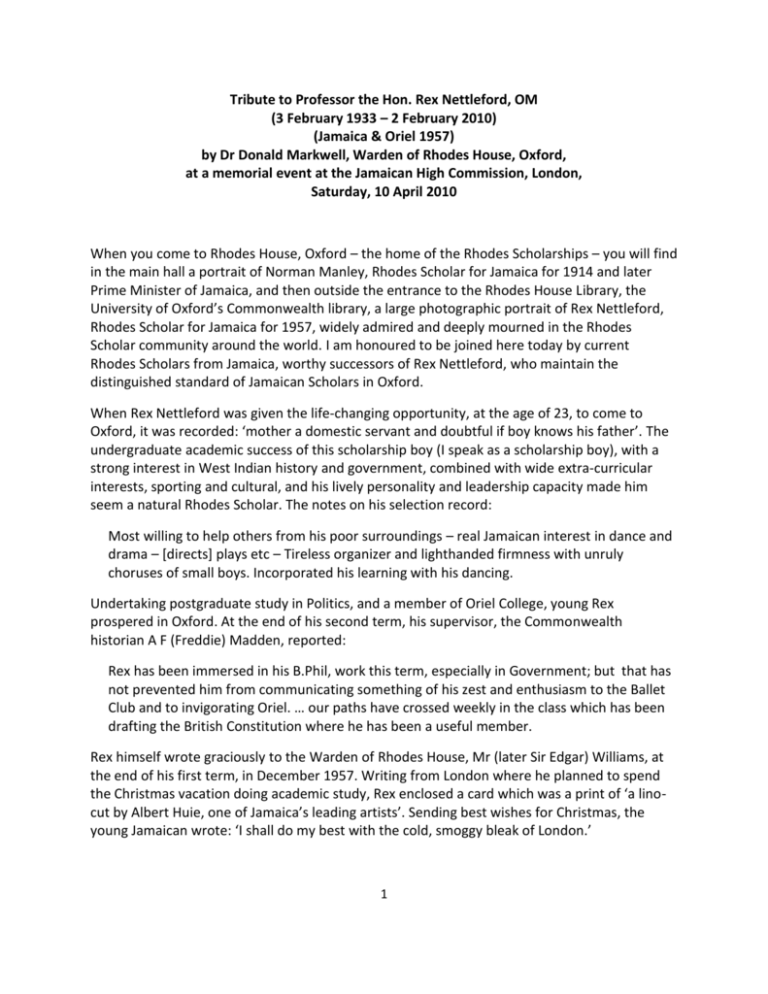
Tribute to Professor the Hon. Rex Nettleford, OM (3 February 1933 – 2 February 2010) (Jamaica & Oriel 1957) by Dr Donald Markwell, Warden of Rhodes House, Oxford, at a memorial event at the Jamaican High Commission, London, Saturday, 10 April 2010 When you come to Rhodes House, Oxford – the home of the Rhodes Scholarships – you will find in the main hall a portrait of Norman Manley, Rhodes Scholar for Jamaica for 1914 and later Prime Minister of Jamaica, and then outside the entrance to the Rhodes House Library, the University of Oxford’s Commonwealth library, a large photographic portrait of Rex Nettleford, Rhodes Scholar for Jamaica for 1957, widely admired and deeply mourned in the Rhodes Scholar community around the world. I am honoured to be joined here today by current Rhodes Scholars from Jamaica, worthy successors of Rex Nettleford, who maintain the distinguished standard of Jamaican Scholars in Oxford. When Rex Nettleford was given the life-changing opportunity, at the age of 23, to come to Oxford, it was recorded: ‘mother a domestic servant and doubtful if boy knows his father’. The undergraduate academic success of this scholarship boy (I speak as a scholarship boy), with a strong interest in West Indian history and government, combined with wide extra-curricular interests, sporting and cultural, and his lively personality and leadership capacity made him seem a natural Rhodes Scholar. The notes on his selection record: Most willing to help others from his poor surroundings – real Jamaican interest in dance and drama – [directs] plays etc – Tireless organizer and lighthanded firmness with unruly choruses of small boys. Incorporated his learning with his dancing. Undertaking postgraduate study in Politics, and a member of Oriel College, young Rex prospered in Oxford. At the end of his second term, his supervisor, the Commonwealth historian A F (Freddie) Madden, reported: Rex has been immersed in his B.Phil, work this term, especially in Government; but that has not prevented him from communicating something of his zest and enthusiasm to the Ballet Club and to invigorating Oriel. … our paths have crossed weekly in the class which has been drafting the British Constitution where he has been a useful member. Rex himself wrote graciously to the Warden of Rhodes House, Mr (later Sir Edgar) Williams, at the end of his first term, in December 1957. Writing from London where he planned to spend the Christmas vacation doing academic study, Rex enclosed a card which was a print of ‘a linocut by Albert Huie, one of Jamaica’s leading artists’. Sending best wishes for Christmas, the young Jamaican wrote: ‘I shall do my best with the cold, smoggy bleak of London.’ 1 At the end of his third term the next summer, Dr Madden wrote that he had ‘very little contact’ with Rex that term as he was doing ‘other work for his B.Phil.’ He might also have mentioned Rex’s extensive extra-curricular activities during term. ‘However’, Dr Madden continued, ‘my ignorance of his progress is now being remedied, as he has decided that we can have weekly tutorials during this summer vac. in his special paper on Comparative Colonial Government.’ After that series of tutorials during the long summer vacation which Rex charmed his supervisor into giving him, Dr Madden wrote: Rex did a number of essays for me during the Long Vacation and impressed me with his ability, his maturity and his sense of proportion. He has considerable capacity for work – particularly the facility of getting hold of the essential facts and arguments in long government white papers and constitutions. But his presentation of them is not pedestrian: he is no earthworm. His personality is impressed upon his writing: the judgments he makes are his own. The Dean of Oriel College, also a scholar of politics and history, Christopher Seton-Watson, wrote in that summer of 1958: ‘Mr Nettleford has made a considerable impact on the College during his first year, through his energy and vitality, sociability and varied talents. He has been a great asset to the life of the College.’ A year later, in the term in which Rex Nettleford passed his degree where several others were failed, a Fellow of Oriel, Dr J W Gough, reported: ‘I hear nothing but good of the part he plays in the life of the college.’ He had also found time to be a choreographer and producer of Oxford operatic and theatrical productions, including one that went to the Edinburgh Festival in the summer of 1959, just before Rex returned home to Jamaica to be Resident Tutor in the Department of Extra Mural Studies at the University College of the West Indies, a capacity in which he had temporarily served just before coming up to Oxford two years before. Those qualities of intellect and character, those passions and that personality, those deep interests in culture, Caribbean, constitutional citizenship, and Commonwealth, which were so evident in his years as a Rhodes Scholar in Oxford, greatly helped to shaped Rex Nettleford’s remarkable life and career over the half-century since, until the grim news of this last February. Rex maintained links with successive Wardens of Rhodes House – his file at Rhodes House contains many lively letters from him, over the decades from the 1950s to the 2000s - and he was an active participant in the Rhodes affairs of Jamaica and the Commonwealth Caribbean, serving for many years on the Rhodes Scholar selection committee in Jamaica. After Norman Manley died in 1969, Rex Nettleford wrote to the Warden of Rhodes House in September 1970 saying that he was editing a volume of Norman Manley’s speeches from 1938 to 1968, and also mentioning the imminent publication of a book of his own dealing with ‘identity, race and protest in Jamaica’, and the publication the previous year of ‘Roots and Rhythms, the story of the Jamaica National Dance Theatre Company’. In a later letter discussing Rhodes Trust financial support for the Norman Manley book, Rex wrote: ‘I am 2 making the contribution because of my own belief in what Manley did for Jamaica and his contribution to the political literature of decolonization.’ Over subsequent decades, the widespread and warm admiration which Rex earned around the world was evident in many ways. In 2002, he gave a ‘brilliant’ Commonwealth Day lecture at Rhodes House. The Jamaica and Commonwealth Caribbean Secretary to the Rhodes Trust, Peter Goldson, and his wife Suzanne were there, and they recall – I quote – that ‘it was truly remarkable for us to observe the warmth and respect with which he was greeted by old friends and prominent academics from around the Commonwealth’. My own link with Rex Nettleford was initially through our shared involvement with Commonwealth affairs. In 2003, the centenary year of the Rhodes Scholarships, when the University of Oxford conferred honorary degrees on four prominent Rhodes Scholars from around the world – one of them former Australian Prime Minister Bob Hawke - Rex Nettleford was one of the chosen four. The citation described him as ‘a vice-chancellor, a man of the greatest versatility: effective in action, outstanding in erudition, and most supple in the dance’. The following year, the Rhodes Trust established the Rex Nettleford Fellowship in Cultural Studies, not least ‘to honour Rex’s distinguished contribution to higher education and the cultural life of the Caribbean’. One of my first acts as Warden of Rhodes House last July was to confirm that a Rex Nettleford Fellowship could be awarded in 2010. On his death this year, Peter Goldson wrote: ‘The Rhodes community will forever remember Rex as a man who exhibited the best of Cecil Rhodes’ aspirations of a scholar who was not a mere bookworm but one who valiantly and colourfully engaged in the world’s fight.’ In another warm remembrance of Rex, a Canadian Rhodes Scholar of the 1950s who became a Canadian Vice-Chancellor, Ian Macdonald, wrote: ‘The one practice for which I did not share Rex’s enthusiasm was his penchant for breakfast meetings. Nevertheless, I cherish my last such occasion with him on the Mona Campus of the University of the West Indies on March 7, 2007 when he was as sparkling as the morning sun.’ On this sparkling and celebratory but also sad morning, I am sure that for so many people, Rex Nettleford will truly remain in cherished memory, as he was in life, ‘as sparkling as the morning sun’. 3
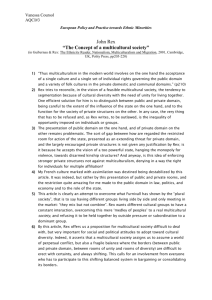


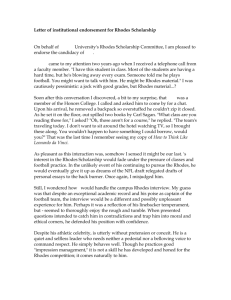

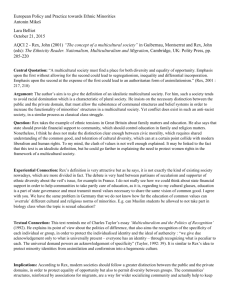
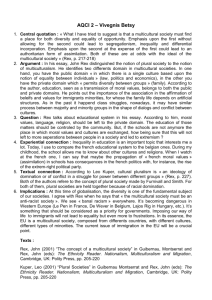
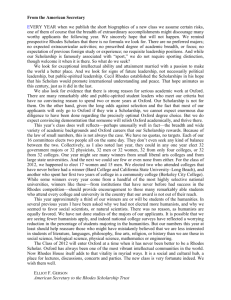
![JimmyPRelated_Organisms_Web_Quest[1]](http://s3.studylib.net/store/data/007568649_2-e16ebf3d449a5b5d84adbcd6a4c62cf6-300x300.png)